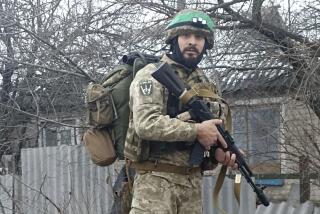‘Nirvana’ in Bogota for freed hostage
- Share via
BOGOTA, COLOMBIA — Ingrid Betancourt, whose plight in captivity came to embody Colombia’s fratricidal social strife, embraced her grown children for the first time in more than six years Thursday and prepared for a trip to Paris and a state welcome in France.
The exhilarated Betancourt, thin but seemingly in good health and flashing a broad smile after being rescued from her rebel captors Wednesday, has generated a sense of euphoria and hope in a nation eager to shed the legacy of more than four decades of civil conflict and generalized despair.
“Paradise, nirvana, must be something very close to what I am feeling in this moment,” she said on an airport tarmac after being reunited with her two children, Lorenzo, 19, and Melanie, 22, who arrived in Bogota on a French government aircraft. “These children are my light, my moon, my stars. It was the desire to see them again that drove me to get out of the jungle.”
It was another nationally televised chapter in the sociopolitical drama that has transfixed Colombia and much of the world. Betancourt is a dual citizen of Colombia and France, and her case has become a cause celebre in France while generating intense interest throughout Latin America.
“This has been the triumph of life, the triumph of peace, the triumph of democracy and liberty,” Chilean President Michelle Bachelet, a former political prisoner, said Thursday in her nation’s capital, Santiago, at the other end of the continent.
Whereas three U.S. contractors released along with Betancourt were whisked off to a Texas military base for medical observation, she has been a ubiquitous and ecstatic presence here in the Colombian capital in the hours since her liberation in an audacious military rescue mission.
Long rumored near death, she has displayed a vivaciousness that has delighted compatriots following her family saga and tragedy like a real-life soap opera.
Betancourt, 46, lamented having lost precious years of her children’s youth and vowed to “be stuck to them like chewing gum” from now on. The former senator was kidnapped by rebels with the Revolutionary Armed Forces of Colombia, or FARC, while running for president on a peace platform more than six years ago.
Betancourt appeared far from the dour, downcast figure in a photograph released last year by the rebels.
After her release, she first appeared in public with braids and a floppy military cap, smiling and holding back tears. She seemed notably lacking in rancor, while harshly criticizing the rebels’ hostage-taking strategy.
On Thursday, she also caught up with another lost aspect of her family life: She stopped by the church that holds the remains of her father, who died while she was in captivity. Colombians at the church broke into spontaneous applause as she left.
The rescue of Betancourt, the American defense contractors and 11 other hostages has abruptly transformed this beleaguered nation’s mood and may even have broader implications: News reports were already speculating on her presidential candidacy, declaring her a favorite.
“I continue with the illusion of serving Colombia,” she said after her release. “Only God knows if it were to be from the presidency.”
Betancourt’s release has probably dealt a blow both to the leftist rebels and their perceived chief benefactor, Venezuelan President Hugo Chavez.
On Thursday, Chavez congratulated his chief nemesis, Colombian President Alvaro Uribe, for the rescue operation, in which no one was injured. But pro-Chavez Venezuelan media took umbrage at Betancourt’s insistence that Chavez and his allies follow “the democratic road,” a subtle chiding of the Venezuelan president.
One of Chavez’s major international chips was his role as a mediator who could gain the release of hostages, as he did this year in Colombia. But it was the Colombian army and Uribe, not Chavez, who won the liberty of the FARC’s most prized prisoners.
The charismatic and telegenic Betancourt and her compelling saga have eclipsed Chavez and almost everything else, at least for the moment.
“For Colombians, Ingrid has been converted into a symbol of human resistance in the face of the brutality of kidnapping,” wrote the weekly Semana in a special edition. “Ingrid Betancourt embodies in her fragile humanity and in her admirable courage the universal trajectory of our country’s tragedy.”
There is new hope for the release of other hostages. As many as 700 Colombians remain in rebel hands.
At a news conference, Betancourt said she would work for the release of people unfairly imprisoned in Colombia and worldwide.
“We always feared a rescue attempt because of the risks,” Melanie, her daughter, told reporters. “But now that we are living in this happiness we want to enjoy it, and we are going to keep on fighting for the freedom of the other hostages.”
In the U.S., Army officials evaluating the three rescued Americans said Thursday that all appeared to be in very good mental and physical condition.
Marc Gonsalves, Thomas Howes and Keith Stansell, all Northrop Grumman Corp. contractors taken prisoner when their plane crashed in February 2003 during a drug surveillance mission, were flown to Brooke Army Medical Center in San Antonio late Wednesday for a “reintegration” and “decompression” program. The military has used the process for freed prisoners of war and hostages since the Vietnam War.
Officials said the three were being given a battery of tests to gauge their physical and psychological health before being released to their families, a process that would probably take two to four days.
--
Andres D’Alessandro of The Times’ Buenos Aires Bureau, special correspondent Jenny Carolina Gonzalez in Bogota and Times staff writer Miguel Bustillo in San Antonio contributed to this report.
More to Read
Sign up for Essential California
The most important California stories and recommendations in your inbox every morning.
You may occasionally receive promotional content from the Los Angeles Times.










